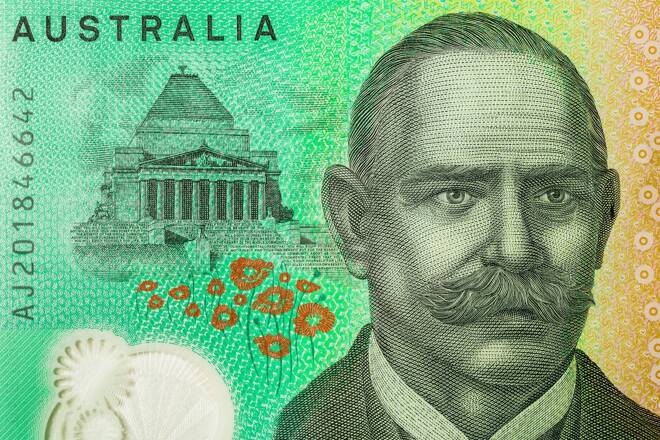Advertisement
Advertisement
AUD to USD Forecast: Fed and RBA Policy Divergence in Focus
By:
Key Points:
- On Friday, July 19, monetary policy divergence between the Fed and the RBA will require consideration.
- Inflation and employment trends to keep pressure on the RBA to raise interest rates.
- Later in the session on Friday, FOMC Member commentary could influence expectations of multiple 2024 Fed rate cuts.
Aussie Unemployment Rate Rises
On Friday, July 19, investor sentiment toward the RBA rate path will influence the AUD/USD.
The Australian unemployment rate increased from 4.0% in May to 4.1% in June. However, the unemployment rate uptick was due to a higher participation rate, indicating more individuals entering the labor market.
Notably, employment rose by a healthy 50.2k in June after an increase of 39.5k in May.
The labor market data signaled tightness, which can support wage growth and increase disposable income. Higher disposable income may fuel consumer spending and demand-driven inflation.
Higher inflation could support an RBA interest rate hike to curb spending.
Reaction to the Employment Numbers
ABS Head of Labor Statistics Bjorn Jarvis commented on the labor market data, stating,
“The employment-to-population ratio and participation rate both continue to be near their 2023 highs. This, along with the continued high level of job vacancies, suggests the labor market remains relatively tight, despite the unemployment rate being above 4.0 percent since April.”
The June numbers could allow the RBA to raise interest rates to tame inflation.
Aussie Monthly CPI Indicator to Test RBA Commitment to Restore Price Stability
The Australian Monthly CPI Indicator jumped from 3.6% to 4.0% in May. Higher inflation could force the RBA to raise interest rates in Q3 2024.
In the June RBA press conference, RBA Governor Michele Bullock said the Board discussed raising interest rates. The meeting was before the Monthly CPI Indicator data.
Tight labor market conditions could ease RBA Board Member concerns about higher borrowing costs and unemployment. A hawkish RBA rate could drive the AUD/USD toward $0.70.
Expert Views on the RBA Rate Path
VanEck Head of Investments and Capital Markets Russel Chester commented on the labor market numbers, stating,
“Today’s data release wasn’t the Hail Mary pass the RBA may have been hoping for.[…]. With inflation at 4% and showing no signs of slowing, the RBA will (have) to capitulate at some point and increase rates. This is the only way to realistically get inflation down.”
However, the Monthly CPI numbers drew mixed reactions.
Bloomberg TV APAC Chief Markets Editor David Ingles also had a hawkish outlook, suggesting a 50-50 probability of an RBA rate hike in September.
In contrast, Westpac Chief Economist Luci Ellis had a dovish outlook, expecting a November rate cut.
US Economic Calendar: FOMC Members in Focus
Later in the session on Friday, FOMC voting Members Raphael Bostic and John Williams will speak.
This week, NY Fed President John Williams dismissed a July rate cut but supported a September move. Unless Williams deviates from his previous comments, Bostic’s views may influence the AUD/USD more. The Atlanta Fed President has not commented on monetary policy since Fed Chair Powell’s testimony and speeches.
Recent inflation and labor market data have fueled expectations of a possible September Fed rate cut. Views on inflation, the economy, and the timing for a Fed interest rate cut could move the dial.
According to the CME FedWatch Tool, the probability of a September Fed rate cut fell from 100% on Wednesday to 98.1% on Thursday. 98.1% is a sign of investors being very confident about a rate cut.
Short-Term Forecast: Bullish
Near-term AUD/USD trends hinge on central bank commentary. Dovish Fed comments could support investor bets on multiple 2024 Fed rate cuts. A more dovish Fed rate path could tilt monetary policy divergence toward the Aussie dollar and push the AUD/USD toward $0.70.
Investors should remain alert, with Fed speakers in focus on Friday. Monitor the real-time data, news updates, and expert commentary to adjust your trading strategies.
Stay updated with our latest views and analysis to manage exposures to the forex markets.
AUD/USD Price Action
Daily Chart
The AUD/USD remained above the 50-day and 200-day EMAs, affirming the bullish price signals.
An AUD/USD return to the $0.67500 handle would support a move toward the $0.67967 resistance level. Furthermore, a breakout from the $0.67967 resistance level could give the bulls a run at the $0.68500 handle.
FOMC Member speeches require consideration on Friday.
Conversely, an AUD/USD drop below the $0.67003 support level could give the bears a run at the top trend line and the 50-day EMA. A fall through the 50-day EMA would bring the 200-day EMA into view.
With a 14-period Daily RSI reading of 51.39, the AUD could move through the $0.67967 resistance level before entering overbought territory.
About the Author
Bob Masonauthor
With over 28 years of experience in the financial industry, Bob has worked with various global rating agencies and multinational banks. Currently he is covering currencies, commodities, alternative asset classes and global equities, focusing mostly on European and Asian markets.
Advertisement
